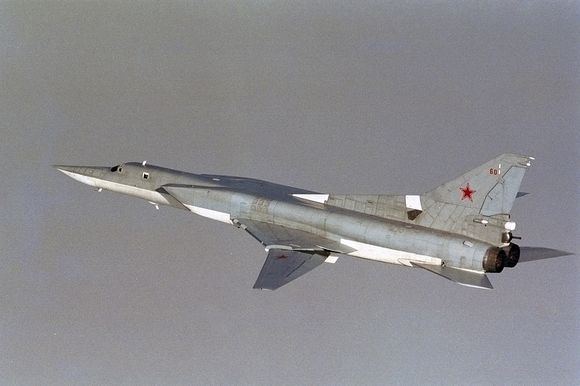
From Bill Gertz, Free Beacon: A Russian bomber recently carried out simulated cruise missile attacks on U.S. missile defenses in Asia, raising new questions about Moscow’s goal in future U.S.-Russian defense talks.
According to U.S. officials, a Russian Tu-22M Backfire bomber on Feb. 26 simulated firing air-launched cruise missiles at an Aegis ship deployed near Japan as part of U.S. missile defenses.
A second mock attack was conducted Feb. 27 against a ground-based missile defense site in Japan that officials did not identify further.
The Pentagon operates an X-band missile defense radar on the northern tip of Japan that is designed to monitor North Korean missile launches and transmit the data to missile-firing ships. . . .
The incidents were detected by U.S. intelligence-gathering systems in the region and reported recently inside the Pentagon.
“As a matter of policy we do not comment on matters of intelligence,” Lt. Col. Catherine Wilkinson said when asked about the Backfire bomber incident.
The Tu-22 bomber can carry up to three air-launched Kh-22 land attack cruise missiles. The bomber has a range of about 2,500 miles. . . .
Eric Edelman, undersecretary of defense for policy during the George W. Bush administration, said it is difficult to assess why the Russians carried out the simulated strikes. . . .
“In the wake of the administration’s ‘restructuring’’—read cancelation—of the SM-3 Block IIB which was supposedly the most neuralgic part for Moscow of the administration’s [European Phased Adaptive Approach], the Russians are signaling that they are pocketing that concession and upping the ante in their opposition to missile defense—not just in Europe, but globally,” Edelman told the Free Beacon in an email.
The Russians in the past have said their opposition to missile defense was not limited to Europe but included global missile defense deployments, he said. “This is just a symbol of how much that remains the case.”
The latest bomber encounter in Asia comes weeks before White House National Security adviser Thomas Donilon will visit Moscow in an effort to restart stalled missile defense talks with the Russians, who for the past four years have demanded legal restrictions on U.S. missile defenses in Europe.
Donilon is expected to seek a Russian return to the negotiating table after the Pentagon announced last month it is scrapping plans for a high-powered variant of the Navy’s SM-3 missile interceptor called the Block IIB. The cancellation was widely viewed as a concession to Russia. The Russians are opposed to placing interceptors in Europe and claim the missile will be used against Russian offensive missiles.
The bomber targeting of U.S. missile defenses also followed stepped up Russian bomber activities targeting other U.S. missile defense sites, including ground-based interceptors in Alaska and California. A large-scale Russian military exercise in the Arctic in June included flights by two Tu-95 Bear bombers that Russian military officials said had simulated attacks on U.S. missile defenses in Alaska.
Another pair of Tu-95s flew on July 4 the closest to the California coast that a Russian bomber had flown since the days of the Soviet Union, when strategic bomber flights near U.S. coasts were a routine feature of the Cold War.
Russian targeting of missile defenses also comes as Moscow’s GRU military intelligence announced April 1 that it would deploy a new reconnaissance ship in the Pacific to spy on U.S. missile defenses in Alaska and Hawaii.
The ship Yuri Ivanov will begin service next year, military sources told the state-run Izvestia news outlet.
One source said the main mission of the ship would be to monitor U.S. missile defense components in Alaska and Hawaii. The ship will be outfitted with electronic sensors that allow detection, interception, and analysis of signals from radar, weapons systems, and communications. . . .
Moscow has said the European defenses pose a threat to Russian security and late last year a Russian general threatened preemptive attacks on U.S. missile defense sites in any future crisis. . . .
Former chief of the Russian General Staff Gen. Yuri Baluyevsky told a conference earlier this week in Moscow that the United States has not abandoned strategic plans for preventive nuclear strikes on both Russia and China. Baluyevsky said U.S. missile defenses are designed to prevent attacks after a U.S. first-strike nuclear attack, Interfax AVN reported April 2.
Former Russian Strategic Rocket Forces commander Col. Gen. Victor Yesin at the same conference said Russian offensive missiles would be able to overcome any U.S. missile defense system. (photo: Reuters)
Image: reuters%202%2017%2012%20Russian%20bomber%20Tu-22M.jpg
